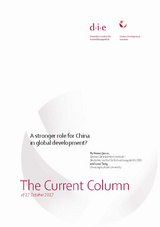Die aktuelle Kolumne
China’s 19th Party Congress: A stronger role for China in global development?
Janus, Heiner / Lixia TangDie aktuelle Kolumne (2017)
Bonn: German Development Institute / Deutsches Institut für Entwicklungspolitik (DIE) (Die aktuelle Kolumne vom 17.10.2017)
Starting Wednesday, 18 October 2017, key political decisions will be announced at the 19th Congress of the Communist Party of China Beijing. While most observers focus on the changes in the party’s leadership, it is the so called political report of the Congress that will set the Chinese policy agenda for the next five years. As the highest decision-making organ of the Communist Party, the Congress and its report have enormous influence on Chinese and global politics. What does this mean for global development and foreign aid?
The political report is drafted by a special committee, following a year-long consultative process of gathering inputs from across government and from experts. The report is, therefore, a laboriously crafted consensus document, shared by all major constituencies within the Communist Party. As a result, formulations are broad and often unspecific. Still, wording matters, even if the significance of a specific phrase is not apparent at first. The meaning of key passages often emerges later, after further elaboration and interpretation.
The report contains large sections that remain unchanged; continuity prevails. For President Xi Jinping, however, this is the first political report of the Congress to prominently feature his policy ideas, including the “Chinese Dream” – often presented as vision for development – and the “New Type of Great Power Relations”, which sets out China’s foreign policy aspirations and relations with the US. Notably China now declares itself as a ”Great Power”, and not just a developing country.
Three key trends
Traditionally, the report first and foremost focuses on domestic issues. China’s engagement in international development will be outlined in the second to last section (the 11th of 12), which in 2012 was entitled “Continuing to Promote the Noble Cause of Peace and Development of Mankind”. Despite foreign policy’s limited role, this part of the report will determine key lines for China’s international relations in the next years. We expect this vision to promise a more assertive role for China in global governance and foreign aid, based on three key trends of the last years.
First, China has initiated a big push on global development, most notably through the launch of the “One Belt One Road” Initiative, also known as the Silk Road of the 21stCentury. This cross-regional integration effort bundles Chinese aid, trade, investment, loans and political influence into infrastructure projects across Asia, Africa and Europe. More than 60 countries are included and about USD 926 billion in investments have been announced. In addition, China continues to promote regional development under the Forum on China-Africa Cooperation (FOCAC), the Shanghai Cooperation Organisation (SCO) for Central Asia and the China and Community of Latin American and Caribbean States (CELAC) Forum.
Second, China has increased its engagement in multilateralism. Speaking at the World Economic Forum in Davos in January, President Xi called China the defender of globalisation and free trade, in marked contrast to the US administration under President Trump. China is now the second-largest funder of the UN, and the biggest provider of UN peacekeeping troops among the UN Security Council’s permanent members. China continues to back the Paris climate agreement and the Iran nuclear deal. The IMF voting rights reform in 2010 formalised China’s position as the 3rd largest member country in the IMF. In 2016, the Renminbi became a global reserve currency. During its G-20 Presidency last year China championed the implementation of the 2030 Agenda, linking its G-20 and UN activities. Two new multilateral institutions, the New Development Bank (“BRICS bank”) and the Asian Infrastructure Investment Bank (AIIB) are backed by China.
Third, Chinese cooperation is targeted more strongly at achieving the 2030 Agenda. In 2015, China made commitments for South-South Cooperation of over USD 5 billion, including a USD 2 billion commitment to development assistance for poor countries to eradicate poverty. In 2017, China launched the China Center for International Knowledge on Development (CIKD) to share “China’s wisdom” and put forward “China’s proposals” for international development. On foreign aid, China does not intend to join the OECD club of donors, but it could explore more coordination of global engagement in different platforms, including for instance the Global Partnership for Effective Development Co-Operation.
A new global role for China
All these foreign policy pursuits are strongly embedded in China’s domestic core interests— national sovereignty, territorial integrity, and domestic development – especially its pursuit of the “Chinese dream”. However, in a global context that is increasingly defined by zero-sum thinking, Chinese ideas of “mutual interest” and “win-win” cooperation offer themselves as an alternative to the at times inadequate engagement of Western countries on the global stage.
China is also reshaping its own role in international cooperation, from being a participant and follower to acting as a provider of new developmental proposals and solutions. Development actors, including Western aid agencies and China, should continue their mutual learning and exchange, with the goal of addressing global development challenges together. Western countries should prepare to engage with a China that is much more assertive and at the same time willing to share lessons based its own development experiences.
Heiner Janus is a Researcher at the Department Bi- and Multilateral Development Cooperation at German Development Institute / Deutsches Institut für Entwicklungspolitik (DIE)
Lixia Tang is Associate Professor at the College of Humanities and Development Studies, China Agricultural University, Beijing


